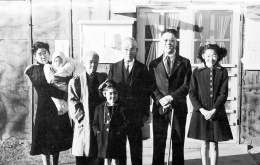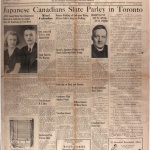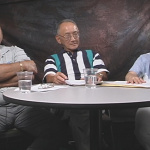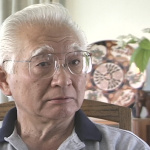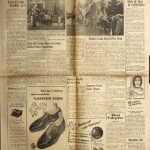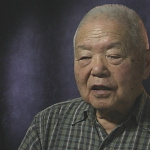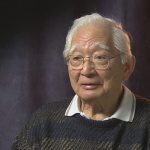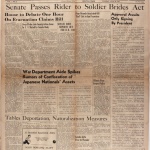James Sakamoto
| Name | James "Jimmie" Sakamoto |
|---|---|
| Born | 1903 |
| Died | December 3 1955 |
| Birth Location | Seattle, WA |
| Generational Identifier |
Boxer, newspaper publisher, and Japanese American Citizens League (JACL) founder. James "Jimmie" Sakamoto (1903–55) was an influential leader of one segment of the Nisei community before World War II. Urging fellow Nisei down an Americanization path in his Seattle-based newspaper, the Japanese American Courier , the blind former boxer was also one of the architects of the JACL philosophy. After being granted a leadership position in the administration of the Puyallup Assembly Center , his influence waned after the war. He died at age 52 from injuries sustained from getting hit by a car.
Early Life and Courier
James Yoshinori Sakamoto was born in Seattle in 1903 to Osamu and Tsuchi Sakamoto, Issei who had migrated to the U.S. from Yamaguchi prefecture in 1894. Osamu had worked in a sawmill and as a farm worker before embarking on a string of businesses that included a restaurant, hotel, and used furniture store. Jimmie attended Seattle public schools including Pacific Grammar School and Franklin High School. At Franklin, be became a star athlete despite weighing less than 130 pounds. At age seventeen, the confident high schooler testified before a U.S. House committee investigating Japanese immigration . He also tried to enlist in the U.S. Army when the U.S. entered World War I, but was turned away due to his age.
Before graduating from high school, he decided to move east, finishing school in Princeton, New Jersey, and subsequently becoming the English language section editor of the Japanese American News in New York, position he held for three years. He married Frances Imai while in New York and had a daughter. He also pursued professional boxing, even fighting in Madison Square Garden. But his New York sojourn ended badly, with the untimely death of his wife and with eye injuries suffered in the ring putting him on the road to total blindness. He returned to Seattle in 1927.
Well-known from his days as an athlete, he became involved in Japanese American community politics and in 1928, with help from his parents, he started a pioneering newspaper he called the Japanese American Courier , the first to be published entirely in English for a Nisei audience. Sakamoto also became one of the founders of the fledgling Japanese American Citizens League (JACL), serving as national president from 1936 to 1938. He also organized a sprawling Japanese American sports organization known as the Courier League that came to include dozens of teams in several sports from throughout the Pacific Northwest and that also included a number of Chinese Americans teams. [1] When the JACL newspaper, the Pacific Citizen , ran into difficulties in 1933, Sakamoto agreed to take it on, doing the editing and typesetting of that paper in addition to the Courier until 1939. He also remarried, to the Japan-born Misao Nishitani, and had three more daughters. Misao managed the business end of the newspaper—which often struggled financially—and played a key role in its survival.
As "one of the key ideologues of the JACL," Sakamoto and the Courier espoused a strong faith in American institutions and urged Nisei to do everything possible to prepare themselves to take part in those institutions. While acknowledging discrimination, he felt that Nisei could help bring down those barriers by educating other Americans and to "be able to act and to talk like their fellow Americans. If they can do that there will be no question of their being accepted by their fellows." [2] His conservative brand of Americanism also embraced anti-Communism, opposed militant labor organizations, and discouraged protest over racial issues.
At the same time, historian Yuji Ichioka also points out that Sakamoto and the paper espoused the concept of Nisei as cultural bridge between Japan and the U.S. As part of that role, he argued that Nisei were ideally suited to educate Americans about Japan. The Courier did its part by presenting the Japanese perspective on its expansionism in Asia from 1931 to 1940, decrying the perceived pro-China position of most other American publications. He also encouraged Nisei to learn the Japanese language (Sakamoto himself was bilingual and "as forceful an orator in Japanese as he was in English" according to JACL chronicler and friend Bill Hosokawa ) and to travel to Japan to get first hand knowledge of Japanese cultural and society, as he did in 1931. He did not see any of this as being contradictory to promoting Americanism; indeed Nisei would be better Americans by playing the "bridge" role.
The Crisis of War and Aftermath
As tensions between the U.S. and Japan rose in 1940, the "bridge" concept became untenable, and the paper doubled down on the Americanism theme, promoting unquestioned patriotism. After the Japanese attack on Pearl Harbor, he became chair of the newly formed JACL Emergency Defense Council. In January, that group issued a statement in which they pledged "to uncover all subversive activity in our midst, and if need be we are ready to stand as protective custodians over our parent generation to guard against danger to the United States arising from our midst." The Courier continued to publish into 1942, and, when the exclusion orders came down, advocated cooperation with them "loyally" and "cheerfully." The Courier' s last issue was dated April 24, 1942.
Most of the Japanese population in Seattle was sent to the Puyallup Assembly Center, built on the site of a fairgrounds 35 miles to the south. In a unique arrangement, local army officials largely turned over administration of the camp to the JACL Emergency Defense Council. Sakamoto became "chief supervisor" of the "Japanese staff." Puyallup historian Louis Fiset cites Sakamoto's management style and appointment of JACL friends to other top positions as a source of dissension in the camp that led to the eventual dissolution of Nikkei self-governance. When the Puyallup population moved on to the Minidoka "Relocation Center" in the fall of 1942, there was no leadership role for Sakamoto given the limitations the War Relocation Authority (WRA) placed on self-government and the growing unpopularity of JACL leaders in WRA camps.
When the opportunity came, Misao and the two older daughters left Minidoka to resettle in Indiana, while Sakamoto stayed at Minidoka with the youngest daughter and his elderly parents. When the camp closed, he returned to Seattle, with his family joining him later. Lacking the capital to restart the paper, he eventually took a job with the St. Vincent de Paul Salvage Bureau, a Catholic run charity, where he worked for the rest of his life. On December 3, 1955, he was hit by a car while crossing a street on his way to work and died later that day.
For More Information
Daniels, Roger. Asian America: Chinese and Japanese in the United States since 1850 . Seattle: University of Washington Press, 1988.
Fiset, Louis. Camp Harmony: Seattle's Japanese Americans and the Puyallup Assembly Center . Urbana: University of Illinois Press, 2009.
Hosokawa, Bill. "Blind, But with Vision." Pacific Citizen , December 23, 1955, A4–6, 11. http://ddr.densho.org/ddr-pc-27-51/ .
———. Nisei: The Quiet Americans . New York: William Morrow & Co., 1969.
———. JACL in Quest of Justice: The History of the Japanese American Citizens League . New York: William Morrow, 1982.
Ichioka, Yuji. "A Study in Dualism: James Yoshinori Sakamoto and the Japanese American Courier, 1928-1942." Amerasia Journal 13.2 (1986-87): 49-81.
———. Before Internment: Essays in Prewar Japanese American History . Edited by Gordon H. Chang and Eiichiro Azuma. Stanford: Stanford University Press, 2006. [This compilation includes the earlier article listed above.]
Takahashi, Jere. Nisei/Sansei: Shifting Japanese American Identities and Politics . Philadelphia: Temple University Press, 1997.
Footnotes
- ↑ For more on the Courier League, see Samuel O. Regalado, "Play Ball—Baseball and Seattle's Japanese-American Courier League, 1928-1941" Pacific Northwest Quarterly 87.1 (Winter 1996): 29-37 and Nikkei Baseball: Japanese American Players from Immigration and Internment to the Major Leagues (Urbana: University of Illinois Press, 2013), 70–90; and Shelley Sang Hee Lee, Claiming the Oriental Gateway: Prewar Seattle and Japanese American (Philadelphia: Temple University Press, 2011): 142–77.
- ↑ Yuji Ichioka, Before Internment: Essays in Prewar Japanese American History (Ed. Gordon H. Chang and Eiichiro Azuma; Stanford: Stanford University Press, 2006), 96–97.
Last updated July 29, 2020, 5:39 p.m..

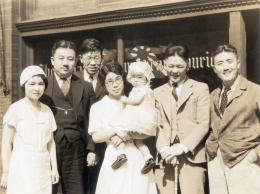 Media
Media
